
|
School was another story though. My school was a Christian institution. Every morning we had to assemble in the 'chapel' and sing hymns. Speaking in Indian languages in school were frowned upon by everyone and soon, unpleasant distinctions were made between the 'vernies' and the ones who were fluent in English. Snob values were inculcated early on and you generally were made to feel privileged to belong to that school. We were taught English literature with a capital E! All the great writers were English or at least Anglo Irish. Shakespeare, Yeats, Whitman (I don't think it occurred to any of my teachers that the great writers they eulogized with missionary zeal were either gay or bisexual or considered completely immoral in their times!). It was only when I watched some Gujrati and Kannada plays in my late teens (and well out of school) that I realized that I didn't know the world at my doorstep. I got involved in theatre and for a long time continued to do European plays in translation. After seeing some good Gujrati theatre in Mumbai, I realized I had to unlearn a lot that I learnt in school. That is when my true education really began.
Mahesh Dattani: You are very generous in placing me in the limelight! The important thing is not to take yourself too seriously. The modicum of recognition (not fame!) that I have received as a playwright is really due to my hard work and good fortune. I do see myself as a vulnerable person, yes. It is a position I choose to be in. True creativity lies in being open to experiences. The minute you close in and build your defenses, you are shutting yourself from all that provides you with experience and a certain enrichment of your senses that ultimately add to your character. We are what we experience! Raj Ayyar: You credit two directors with helping you in building your self-esteem. One is Alyque Padamsee--'Mr. God' as you call him and the other is Lillette Dubey. Could you share some of the highlights of your relationship with them? Mahesh Dattani: I met Alyque about twenty years ago when I had taken my own production of Dance Like A Man to Mumbai. Alyque saw the production with his charming wife Sharon. They invited me to dinner and we talked for hours about the play. He told me that for a long time he was looking for a playwright who could write about the Indian experience in English. From then on we have had a wonderful relationship as playwright and director. He went on to direct my play TARA which got me overnight media attention. More because it had the endorsement of God! Incidentally, I call him Mr. God more out of sarcasm or sometimes to humour him. In the advertising and theatre world of Mumbai he is called God. Lillete is one of the most beautiful women I have met! About ten years ago she walked into my dad's office, where I worked (and also operated my theatre company Playpen). She swished in to the office and declaimed that she was interested in 'looking at my plays'. She had heard about me from Mahesh Elkunchwar, one of the great Marathi playwrights. Both my father and me were completely taken in by her charms! Absolutely gorgeous, stylish and campy as hell! Her production of Dance Like A Man has made some kind of history in Indian English theatre. Raj Ayyar: You have been quoted as saying that Mango Souffle is a 'metrosexual' film. Are you implying that the complexities of relationships, gay and otherwise, are peculiar to the context and the chaos of the big city? If so, why? Mahesh Dattani: Oh dear! That's not what I meant! I guess I wanted a word or term that would include heterosexual behavior but would exclude traditional man/woman role playing. I guess the term cannot be taken too literally! In short it does define in a non judgmental way various aspects of sexuality that probably finds expression in the metros more easily than in other areas where traditional patterns of behavior are more predominant and acceptable.
Mahesh Dattani: Not at all. Neither the play nor the film has suffered on account of its theme. But that obviously doesn't reflect any liberal mindedness in our society. Modern Indian society is just as narrow-minded and un-accepting of differences as traditional Christian or Islamic societies. People talk about the KamaSutra and its celebration of sexuality but how celebratory of sexual expression mainstream Hindu cultures were in the past is anybody's guess. It would be simplistic to put this denial of sexual expression down to Victorian mores. I have a feeling we, as a culture, have become too boring! Raj Ayyar: Inevitably, Western and Indian critics are going to compare Souffle with Fire--the Indian film that sparked such controversy a few years ago because of its explicit exploration of lesbianism. It has been said that Fire gives us a kind of lesbianism by default, in that its female protagonists drift into a same-sex relationship thanks to their loveless, oppressive marriages. Whereas, in Souffle, one could argue that the message is loud and clear: Gay is beautiful and if you're drawn to same-sex love, come out for your own sake and to avoid hurting others. Do you agree with this comparison? Mahesh Dattani: I don't think I agree with this comparison or any comparison for that matter. I think they are both different films and should be appreciated and valued for their own intrinsic merits. Raj Ayyar: I notice that Mango Souffle is based on your play On a Muggy Night in Mumbai (Bombay). Yet, the film alters many of the details of context and plot. It relocates the action from Bombay to Bangalore, cuts out Ed's pathetic suicide attempt, 'outs' Ed more forcefully than the play does. Why these differences?
Raj Ayyar: Could one say that On a Muggy Night in Mumbai presents us with a grittier version of metrosexual reality than does Mango Souffle? For instance, Kamlesh's flat in the play is very much a part of the hustle-bustle chaos of the city (though well-furnished and occupying a privileged space on Bombay's Marine Drive). Souffle lacks this, since most of the action is deliberately distanced from Bangalore, sited at a 'safe' physical, cognitive and emotional distance from the city, out there in a mango orchard miles away. Do you agree? Mahesh Dattani: Again, space time complexities are so different for cinema. What may be defining of emotional constraint spatially in a play would seem static and boring in cinema. Although Souffle shifts the action to a secluded farmhouse, the presence of the outer world is more in focus through the intercuts of the wedding happening next door. In both the play and the film, there is a safety of distance. In the play, the fact that they are on the top floor looking down at the wedding gives them a sense of safety and distance. In the film, once they enter the gates of the farm there is a sense of safety. Raj Ayyar: In a sense, Mango Souffle depends on the incriminating sexually explicit photo of Ed and Kamlesh together, much as Othello hinges on that fateful handkerchief planted in Cassio's lodgings. Do you think that this makes Ed's 'outing' purely fortuitous? Would he have drifted into a loveless, machismo-protecting marriage if the photo didn't pop up inconveniently? Mahesh Dattani: Yes I think it is fortuitous to Kiran and Kamlesh. Otherwise Ed would have drifted into the more acceptable relationship. He would have become a bit like Bunny, the TV star character who has no qualms about hiding his sexuality from his wife. Raj Ayyar: I love Sharad's gay liberation speech in Souffle, where he lashes out against 'penis power' and the pathetic 'wanna be a macho man' self-delusions of many straight males. In fact, though he's such a politically incorrect queen, Sharad unwittingly reveals some of the shared spaces between feminism and gay liberation in that both locate a common oppressiveness in the straight male and his desperate patriarchal clinging to phallocentric superiority, 'normalcy' and privilege. Any comments? Mahesh Dattani: Yes absolutely. There are shared spaces and I think Sharad is aware of these spaces. His camp humor reflects his self awareness and intelligence.
Raj Ayyar: The grimness of sectarian and communal violence in India between Hindus and Muslims was underlined and emphasized by the violent carnage in Gujarat last year. Your play Final Solutions dealt with the repetitive rhetoric of hate, the violence, the mercenary exploitation of religious riots and most of all, with the bigotry and narrowness of those trapped in fundamentalist, Other-bashing, either/or thinking. How can this play be used as an educational tool at grassroots levels? Mahesh Dattani: A play and its content live in performance. The play can best be used in production. When the play was done in Hindi, it had a greater impact than when it was performed in English. Raj Ayyar: You broke a record when you became the first Indian writing in English to win the prestigious Sahitya Akademi award (India's highest literary award). I think that ever since Salman Rushdie, 'Indo-Anglian' writing has come into its own, proliferating with a burst of multi-faceted creativity. What do you think of those who bash Indian writing in English as superficial, cut-off, elitist, not 'really' Indian etc.? Is this kind of pseudo-postcolonialism a way of patronizing vernacular writing in Indian languages? A sort of latter day Noble Savage projection? Mahesh Dattani: I thought we were done with all those language bashing issues but I think you are right. Its still alive. Like writing all over the world, you have some insightful stuff and some very superficial stuff that is 'cut off' and not really reflective in any valuable way. But still a good read is a good read, and a well structured play is worth a hundred boring but well meaning socially relevant stuff. I really feel that people have to come to terms with the fact that English is an Indian language! Just as it is American or Canadian or Australian. We should celebrate the fact that India has this enormous capacity to absorb from all sources. This is exactly how we have survived colonization, unlike the poor Native Americans. We may claim to be rigid and pure, but we are the most flexible and impure of all races! The sooner we come to terms with that, we can get on with the rest. Raj Ayyar: I love many of the lines in your play Dance like a Man. The concluding lines continue to haunt me: "We were only human. We lacked the grace. We lacked the brilliance. We lacked the magic to dance like God." (Mahesh Dattani: Collected Plays, Penguin, 2000, p. 447). Tell us a little about Dance like a Man. Mahesh Dattani: I wrote the play when I was learning Bharata Natyam in my mid twenties. Its a play that I wrote almost twenty years ago. Its a play about a young man wanting to be a dancer, growing up in a world that believes dance is for women. I had in fact shown it to Stephen Daldry when he was at the Royal Court Theatre. Five years later he made Billy Elliot. Maybe the two are unrelated (I am sure they are because the two are different stories after a point), but I felt extremely offended when an American critic titled the headline of his review of my play as Billy Elliot, suggesting it was inspired from the film. Had he done his homework, he would realize how old my play is and that it predates the movie by a good seventeen years. He also compared it with Stoppard's Arcadia (unfavorably to Stoppard) but still, the assumption was that Arcadia came first. Raj Ayyar: Mahesh, is there anything else that you would like to share with readers of Gay Today? Mahesh Dattani: I think I have said quite a bit already! Thanks for this opportunity. |
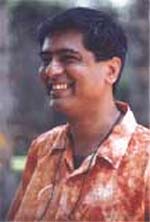 Mahesh Dattani
Mahesh Dattani 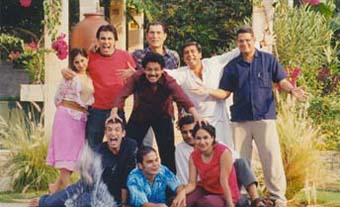 Cast and crew of Mahesh Dattani's Mango Souffle
Cast and crew of Mahesh Dattani's Mango Souffle 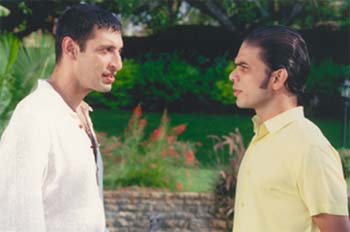 Sharad & Kamalesh in the film Mango Souffle
Sharad & Kamalesh in the film Mango Souffle 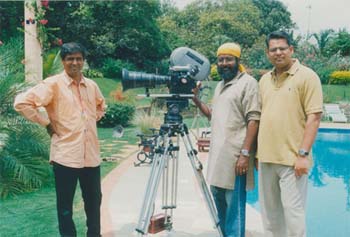 Mango Souffle's Director, Mahesh Dattani (left) Cinematographer, Sunny Joseph (center) and Producer, Sanjeev Shah (right)
Mango Souffle's Director, Mahesh Dattani (left) Cinematographer, Sunny Joseph (center) and Producer, Sanjeev Shah (right) 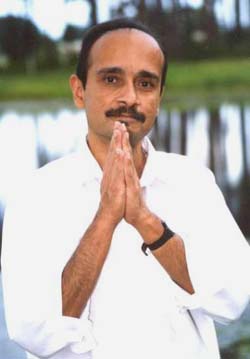 Raj Ayyar
Raj Ayyar